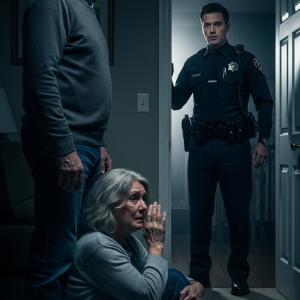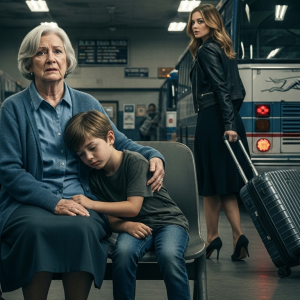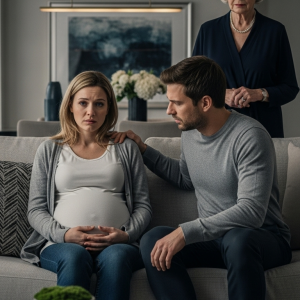Eleanor’s world was circumscribed by the half-acre of land her husband, George, had loved into a paradise. Their house was not a structure of wood and nails, but a living repository of memories. Every scuff on the oak floor was a child’s running feet; every chip in the kitchen counter was from a hastily opened bottle of wine on their anniversary.
Outside, the garden was George’s true masterpiece. He had planted the mighty maple tree in the center of the lawn the day their son, Michael, was born. The weeping willow near the creek was for Caroline. Each rose bush, each stubborn perennial, was a testament to a life built together, root and branch. Since his passing two years ago, the land was her last, most tangible connection to him. It was where she felt his presence most keenly.
It was this deep, abiding love for her home that her children, Michael and Caroline, had begun to use as a weapon. They saw not a sanctuary, but an asset. Not a legacy of love, but untapped real estate potential.
“Mother, you can’t keep up with all this,” Michael would say, his voice a carefully crafted symphony of concern. He’d gesture vaguely at the sprawling garden. “The upkeep is enormous. You need to rest. You’ve earned it.”
Caroline would chime in, her arm draped around Eleanor’s shoulders in a gesture that felt more like possession than affection. “We worry about you, Mom. Alone in this big house. What if you fell? It’s just not practical.”
Lately, their concern had taken on a strange new focus. During their increasingly frequent visits, they would gravitate towards George’s old study, a room Eleanor kept just as he had left it.
“We were just wondering where Dad kept the old land surveys,” Michael asked one afternoon, feigning a casual interest. “You know, for tax purposes. It’s always good to have the paperwork in order.”
A week later, it was Caroline. “Mom, do you remember if Dad ever had a geological report done? Michael and I were thinking about the property insurance, and it’s best to be thorough.”
Eleanor, whose heart ached for any sign of her children’s interest in their father’s life, saw it as a sign of newfound responsibility. She was pleased they were taking an interest, that they cared about protecting their father’s home. She would find the old files for them, her hands tracing the familiar labels of George’s meticulous filing system, never once suspecting she was handing them the schematics for their betrayal.
She remembered George’s words, spoken late one night on the porch, as they looked out at the moonlit garden. “This land will always take care of you, Ellie,” he had whispered, his hand covering hers. “It’s more special than anyone knows. Don’t ever let the kids’ ambition get in the way of its heart.” At the time, she thought it was just poetry. Now, she would come to understand it was a prophecy.
Their campaign of concern escalated. They began to gently point out her “lapses.” A misplaced set of keys became a sign of advancing dementia. Forgetting a minor detail from a story was evidence of a failing mind. They spoke to her in slow, simple sentences, their voices syrupy with a pity that made her skin crawl.
The final push came when Caroline “discovered” a pot left on the stove, the water boiled away. It was a pot Eleanor never used. “Oh, Mom,” Caroline had cried, her voice laced with manufactured terror. “You could have burned the house down! This is what we were afraid of. It’s not safe for you here anymore.”
They presented the solution with the triumphant air of saviors: Willow Creek Manor, a premier assisted living facility. “It’s beautiful, Mom. Like a resort,” Michael had said, showing her a glossy brochure filled with smiling, silver-haired seniors. “And it’s just for a little while. Just until we can sort things out here, make the house safer for you.”
Exhausted, confused, and made to feel like a dangerous burden, Eleanor finally, reluctantly, agreed. She packed a single suitcase, believing she was leaving for a short respite. As she looked back at her home, the late afternoon sun turning the windows to gold, she had no idea she was looking at it for the last time.
Willow Creek Manor was exactly as the brochure had promised: immaculate, orderly, and utterly devoid of a soul. The air smelled of antiseptic and air freshener, a sterile combination that erased all traces of life. The smiles of the staff were as polished and empty as the gleaming linoleum floors. Eleanor’s room was a pleasant, beige box with a window overlooking a manicured lawn that was never meant to be walked on. It was a gilded cage.
The promised visits from her children were frequent at first, then dwindled. The phone calls became shorter, their excuses more elaborate. “We’re just so swamped, Mom. Dealing with the estate is a huge job,” Michael would say. “We’re doing this all for you.”
Eleanor was deliberately isolated. They had chosen a facility three hours from her home, a calculated distance that made it nearly impossible for her old friends to visit. Her neighbor, Mr. Henderson, a retired lawyer and George’s closest friend, had called her once, his voice full of concern. “Eleanor, are you alright? The children were very… abrupt about your move. If you need anything, anything at all, you call me first. That’s what George would have wanted.” The call had been cut short by a nurse, and Eleanor found her phone privileges mysteriously restricted afterward for “her own peace of mind.”
Weeks bled into a month. A deep, gnawing loneliness began to set in. She felt forgotten, a relic stored away in a climate-controlled attic. It was on a bleak Tuesday afternoon, as she sat staring out the window at the unchanging lawn, that a package arrived for her. It was a simple cardboard box, sent by express mail. The return address was Mr. Henderson’s.
Her heart, which had felt numb for weeks, gave a hopeful flutter. She opened it carefully. Inside, lying on a bed of tissue paper, was a stack of glossy photographs. The first one showed the front of her house. But there was a monstrous yellow machine parked on her lawn, its metal claw poised over the porch where she and George had shared thousands of cups of coffee.
Her breath hitched. She flipped to the next photo. It was the great maple tree, George’s pride, lying on its side, its massive root ball torn violently from the earth. Another photo showed the rose garden, a chaotic mess of splintered trellises and crushed blooms. Another showed a gaping hole where the kitchen window used to be. They were systematically demolishing her life, memory by memory.
A sob, raw and ragged, tore from her throat. It was a sound of pure, undiluted heartbreak. They weren’t “making the house safer.” They were erasing it. They were erasing her. The glossy brochure, the feigned concern, the manufactured fall—it was all a lie. A cruel, elaborate theatre designed to get her out of the way so they could plunder her home.
Beneath the devastating photos, her trembling fingers found a sheaf of papers and a handwritten note. The note was from Henderson.
“Eleanor,” it read, his familiar, steady script a small anchor in her sea of grief. “I am so sorry you have to see this. George always planned for the worst. He knew their hearts. Look at the documents. Read Clause 7B. Then call me. It’s not over.”
The papers were thick and formal, a copy of the original deed to the land and another document, bound and sealed with the mark of a notary. It was titled: A Living Testament and Covenant Regarding the Property at 18 Willow Lane. It was a legal document she had never seen before, signed by George and witnessed by Mr. Henderson years ago.
With a cold, rising dread that was slowly morphing into something harder, something steely, she found the section he had indicated. Clause 7B. Her eyes scanned the dense legal text, her mind struggling to comprehend the words, until the meaning finally broke through, like a ray of sunlight through storm clouds.
A fierce, terrible clarity washed over her. The grief was still there, a hot coal in her chest, but it was now surrounded by a growing, ice-cold fury. They had mistaken her love for weakness. Her trust for foolishness. They had forgotten whose wife she was. She walked, with a steady and determined gait she hadn’t felt in years, to the payphone in the common room. She dialed the number from memory.
“Henderson,” he answered on the first ring.
“He knew,” was all Eleanor could manage to say, her voice thick with unshed tears.
“Yes, Ellie, he knew,” Henderson’s voice was gentle but firm, the voice of a lifelong friend and a formidable lawyer. “He called it his ‘scorched earth’ defense. He said the land would protect you, even from your own blood.”
Henderson explained it all. The “living will” tied to the land itself. Her lifetime right of residency. The explicit prohibition against altering the property without her written consent. And finally, he explained the poison pill.
“Clause 7B,” he said, a grim satisfaction in his voice. “It stipulates that any attempt to forcibly remove you or materially alter the property against your will constitutes a breach of the covenant. In the event of such a breach, ownership of the property bypasses the designated heirs—Michael and Caroline—and is immediately and irrevocably transferred to a third-party conservator.”
Eleanor held her breath. “And who is the conservator?”
“Me,” Henderson said simply. “With the legal mandate to ‘preserve the natural beauty and integrity of the land in accordance with George’s final wishes.’ The moment their bulldozer touched that maple tree, Eleanor, they signed their own disinheritance. The land isn’t theirs anymore. It’s ours to protect.”
In the days that followed the call, a profound change settled over Eleanor. The fog of grief and confusion lifted, replaced by a crystalline, diamond-hard resolve. The nurses at Willow Creek noted the difference. The quiet, melancholic woman who shuffled to meals was gone. In her place was a woman who sat with a ramrod-straight posture, whose eyes, when they met yours, were clear and piercingly intelligent. She was no longer a resident; she was a queen in exile, plotting her return.
She spent her time reading, not the light novels from the facility’s library, but the legal documents Henderson had sent, committing them to memory. She was no longer just Eleanor, the grieving widow. She was Eleanor, the enforcer of George’s will, the guardian of his legacy. She was waiting.
Her children finally graced her with a visit the following Sunday. They swept into her small room, their arms laden with cheap flowers and a box of chocolates, their faces plastered with bright, false smiles. They were the very picture of devoted children visiting their beloved, frail mother.
“Mom! You look wonderful!” Caroline chirped, kissing the air beside Eleanor’s cheek. “See? We told you this place would be good for you. You’re getting so much rest.”
“We’ve been so busy, Mom, I’m sorry we haven’t been by,” Michael added, his voice oozing insincere apology. “The work on the house is a massive project. We found some… structural issues. Had to take down a few dangerous old trees. But don’t you worry, we’re handling everything.”
They chattered on, their conversation a masterclass in condescension. They spoke of their grand plans, thinly veiled as a concern for the “family portfolio.” They talked about a “small, boutique resort” and a “lifestyle community,” grand, soulless words that made Eleanor’s stomach turn. They spoke to her as if she were a child, a senile old woman who couldn’t possibly comprehend the brilliant, important work they were doing on her behalf.
All the while, Eleanor remained silent, a serene, impassive Buddha. She listened, her hands folded calmly in her lap, her gaze steady. She let them spin their web of lies, giving them enough rope to hang themselves twice over.
Finally, the true purpose of their visit emerged. Michael pulled a slim leather-bound folder from his briefcase.
“Mom, there are just a few loose ends to tie up with the estate,” he said, his voice dropping into a serious, business-like tone. “Just some final papers to sign. It basically gives us full power of attorney to manage the property. It’s just a formality, to make things easier so you don’t have to be bothered with all the boring details.”
He clicked a pen and slid it, along with the document, across the small table toward her. “If you could just sign right here…”
This was the moment. The culmination of their greed and her grief.
Eleanor did not pick up the pen. Instead, with a slow, deliberate movement, she pushed the stack of photographs into the center of the table. The image on top was of the crushed rose garden, a scene of brutal violation.
The smiles vanished from their faces as if wiped away by a cloth. A flicker of panic appeared in Caroline’s eyes. Michael’s jaw tightened.
“Mom, what are these?” he asked, his voice strained. “Where did you get them?”
Before they could concoct another lie, before they could try to explain away the devastation, Eleanor pushed the second item onto the table. It was the copy of the Living Testament, folded open to the relevant page. A bright yellow highlighter bled through the thin paper, illuminating the damning words of Clause 7B.
Their eyes darted from the photos of their destruction to the legal text that explained its consequences. The color drained from their faces. The silence in the small, beige room was absolute, broken only by the frantic ticking of a wall clock. They were trapped, caught red-handed by the ghost of their own father.
Eleanor finally spoke. Her voice was not the frail, hesitant whisper they were used to. It was clear, steady, and resonated with an authority they had never heard before. It was the voice of George’s wife.
“You came here for my signature,” she said, her gaze moving from her son to her daughter, pinning them in place. “But it seems you already signed away your inheritance. With a bulldozer.”
She leaned back in her chair, a quiet, devastating power emanating from her.
“Mr. Henderson, the new owner of your future resort, sends his regards.”
Part 4: The Land Remembers
The destruction of Michael and Caroline was not loud or dramatic. It was a quiet, systemic collapse, as brutally efficient as the demolition they had initiated.
Financially, they were annihilated. Their entire resort project was built on a foundation of massive, leveraged loans, secured against the perceived value of the land they were to inherit. The moment Mr. Henderson’s lawyers served the construction company with a cease-and-desist order and proof of his legal ownership, their house of cards imploded.
The bank immediately called in their loans. With no collateral, they were instantly bankrupt. Their contractors, with whom they had signed binding agreements, sued them for breach of contract. They lost everything: their own homes, their savings, their cars. Their greed had been a fire that had consumed them whole.
Socially, they became pariahs. The story spread through their community like a contagion. The tale was just too perfectly tragic, too poetically just. The devoted children who had schemed to commit their mother to a home to steal her land, only to be outsmarted by their dead father. They were no longer the successful Sterling heirs; they were ghouls, cautionary tales whispered about at dinner parties and in the aisles of the grocery store.
But the most profound punishment was the psychological one. Their entire lives had been driven by a grasping need for more. That engine of greed had driven them straight off a cliff. They had to live with the immutable fact that their own father had seen the blackness in their hearts so clearly that he had trusted his best friend more than his own children. He had planted a bomb in his own will, and they had willingly, eagerly, lit the fuse.
Eleanor never set foot in Willow Creek Manor again. The day after the confrontation, Mr. Henderson came and took her home. Not to the wreckage of her old house, but to the charming guesthouse on his property, which bordered the land she had shared with George.
From her new porch, she had a perfect view of her old home. She watched as Henderson, true to his word and his friend’s wishes, began the slow, careful process of healing the land. The debris was cleared, not with brutal machinery, but with careful hands. The deep scars from the bulldozer tracks were filled with fresh topsoil and seeded with native grasses.
A landscape architect, specializing in ecological restoration, was brought in. They planted a new maple sapling in the center of the lawn. It was small and slender, but it was a promise. A promise of renewal.
Eleanor spent her days in peace. She drank tea on the porch with her loyal friend, sharing stories of George. She found a quiet joy in watching the land remember itself. The birds returned first, then the wildflowers, pushing up through the wounded earth.
She was not a bitter woman. Her victory was not in her children’s ruin, but in the preservation of what she and George had built together. Her children were lost in a world of their own making, drowning in debt and disgrace. She, meanwhile, was exactly where she was always meant to be: at home, watching over the land that had, in the end, so faithfully watched over her. The will was not just in the paper; it was in the land itself, and the land always remembers.




